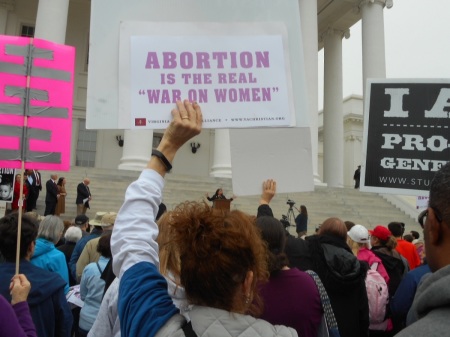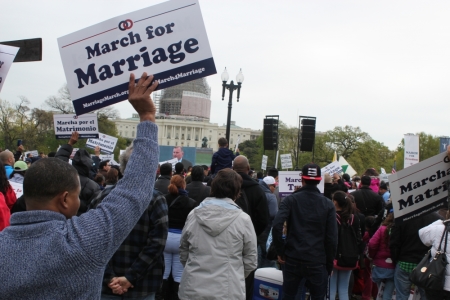Can pro-life state constitutional amendments help end abortion?

Last November, voters in Alabama and West Virginia passed state constitutional amendments that denied that there existed a right to an abortion.
The Alabama State Abortion Policy Amendment, also known as Amendment 2, passed with the support of nearly 60 percent of voters.
"... it is the public policy of this state to recognize and support the sanctity of unborn life and the rights of unborn children, most importantly the right to life in all manners and measures appropriate and lawful; and to provide that the constitution of this state does not protect the right to abortion or require the funding of abortion," read Amendment 2.
West Virginia’s Amendment 1 passed with about 52 percent of voters in favor. The amendment added a section to the state constitution that read, "Nothing in this Constitution secures or protects a right to abortion or requires the funding of abortion."
Mallory Quigley of the national pro-life group the Susan B. Anthony List hailed the results of the two states' referenda, telling The Christian Post that they represented a “tremendous victory.”
“Victories in West Virginia and Alabama show that putting life right on the ballot and letting voters decide can be a valuable means of achieving greater protections for the unborn,” said Quigley.
Alabama and West Virginia joined Arkansas, Colorado, Rhode Island, and Tennessee in having state constitutional amendments that deny a right to an abortion.
“Nothing in this section shall be construed to grant or secure any right relating to abortion or the funding thereof,” reads Article I, Section 2 of Rhode Island’s constitution.
With mounting speculation that the U.S. Supreme Court decision Roe v. Wade is close to being overturned, several states are considering legislation either to expand or restrict abortion access.
Amid the strategies by pro-life groups and politicians, could more states look toward passing pro-life constitutional amendments in the near future?
“Different states will pose different opportunities,” replied Quigley.
The Christian Post interviewed pro-life activists and leaders at both the state and national level to get their opinion on the potential future of anti-abortion state constitutional amendments.
Possible guidance after Roe

Paul Linton, an attorney who formerly served as general counsel for Americans United for Life, told CP that he found the Alabama and West Virginia amendment vote results “very encouraging.”
“Other states will likely consider similar measures, particularly Iowa, where a one-sentence neutrality amendment has already been introduced, and Kansas, in the event the state supreme court recognizes a right to abortion,” Linton said.
When asked how effective pro-life state amendments could be in banning abortion, Linton responded that he believed it “would depend upon the precise language of the amendment.”
“I do not think that state constitutional amendments are typically used to define and punish criminal conduct, which is more a matter for the legislatures to decide,” he explained.
“On the other hand, a strong statement of pro-life principle in a state constitution may act as a restraint on a legislature enacting a ‘liberalized’ abortion law.”
Linton referenced “neutrality amendments” as an example, which state that the constitution does not protect the right to an abortion, noting that they “would enable states to enforce pre-Roe laws prohibiting abortions” or possibly “to enact new laws prohibiting abortion.”
Elizabeth Slattery, legal fellow with the Heritage Foundation, explained that such amendments could “provide guidance if the Supreme Court overturned Roe v. Wade and eliminated a federally recognized right to abortion.”
“The U.S. Constitution provides the ‘floor’ for rights, and the Supreme Court has interpreted the Constitution to protect a right to abortion. States can provide more, but not less, protection for a federally-recognized constitutional right due to the Supremacy Clause,” explained Slattery.
“Thus, these state constitutional amendments are preemptive and would only take effect if the Supreme Court eliminated the federally recognized right to abortion.”
Slattery warned that this may take a while, as “the Supreme Court can’t pluck an issue, like whether abortion should be legal, out of the news and decide to rule on it.”
“The Supreme Court only decides cases that are brought to it and oftentimes won’t tackle a major constitutional issue until numerous lower courts have had the opportunity to rule on it."
‘Measured, prudent steps’

Wanda Franz, Ph.D. of West Virginians for Life, which campaigned for Amendment 1, attributed last November’s success to several factors.
“Primarily, I believe we have a state with people who are primarily religious and are strongly pro-life. Our amendment affected the issue of funding and, therefore, we could ask the public to support something that has the highest level of support by the public in general. In WV, it is more than 60 percent against tax-payer funding of abortion,” explained Franz.
“We’ve also had an impact in the state because we have passed many pro-life pieces of legislation, including the Pain-Capable Unborn Child Protection Act and the Dismemberment Abortion Ban. Most of the leaders in the state are pro-life, and many of them talked about the importance of passing the amendment during their election campaigns.”
Franz also acknowledged the aid they received from the national group the SBA List, which launched a $500,000 campaign in support of Amendment 1.
Some measures are not as successful. In 2014, for example, North Dakota voters considered but ultimately rejected a “personhood” amendment known as Measure 1 that would have amended the state constitution to provide for the “inalienable right to life” at all stages of human development.
“Opponents claimed that the amendment was attempting to add ‘fetal development’ as a ‘stage of life.’ They also argued that the measure was poorly written, too vague and too broad, therefore the amendment could have affected access to birth control, IVF and abortion,” recalled Medora Nagle, executive director at North Dakota Right to Life.
“I think that if it would’ve been written with more detail, it may have had a chance, but it’s still unlikely in my opinion that it would’ve passed due to the fact that so many people have a different opinion of when life begins.”
Nagle explained that her organization works with legislators to advance pro-life legislation. Nagle is part of a pro-life caucus that meets about every two weeks to discuss any proposed pro-life legislation.
“We, NDRL, would definitely support any and all pro-life legislation that would be brought, whether that is in the form of an amendment to the constitution or as a bill going through the House and the Senate,” Nagle said.
“I do believe that passing pro-life amendments to state constitutions are very important to helping our country to become abortion-free. Unfortunately, we are now seeing more and more states passing extreme laws allowing abortion to happen until birth and even during labor. I’m not sure there is a lot of hope for these pro-abortion states like New York.”
Mary Kay Culp, executive director of Kansans for Life, told CP that past success in the state legislature meant that they had not initially seen an amendment as “part of our strategy.”
However, because of current litigation before the state Supreme Court over whether abortion is a right, they “may need to pass” such an amendment “soon.”
Culp explained that the potential amendment would contrast with other pro-life state amendments in that it would be more centered on making sure courts cannot control the issue.
“We’re just going to be asking the public, asking them ‘we want your elected representatives to be able to regulate this issue, not the courts, not our state supreme court,'” said Culp.
Other state-level pro-life groups have likewise focused on legislative efforts rather than constitutional amendments.
For example, Texas Right to Life Director Elizabeth Graham explained that her organization has the strategy of taking “measured, prudent steps to extend legal protection to as many innocent human lives as possible.”
Graham spoke of “incremental legislation” that must include three fundamental aspects: that the proposed legislation “must actually save lives,” center the debate on “the humanity of the preborn child and the barbarism of abortion,” and “must undermine the faulty logic upon which Roe v. Wade was established.”
“Prudent incrementalism is the most realistic mechanism to end abortion in Texas,” Graham stated, citing the Preborn NonDiscrimination Act (PreNDA) as an example of their gradual process.
Listed as a priority by Texas Right to Life for the current legislative session, the PreNDA would, among other things, ban abortion on the basis of race, sex, or “suspected disability.”
"Justice and equality are values that both Republicans and Democrats can rally behind in PreNDA,” noted Graham. “The measure has wide grassroots support; 91 percent of delegates voted to add the policy to the 2018 Republican Party of Texas Platform.”
A repeat of history?

From 1998 to 2012, voters in 30 states approved state constitutional amendments that defined marriage as only being between one man and one woman.
Despite the broad support among the electorate for these bans, a series of court decisions struck down most of these constitutional amendments, with the United States Supreme Court striking the final blow with a 5-4 ruling in 2015.
When asked if she thought a similar fate could meet the pro-life state constitutional amendments, Quigley of SBA List believed that they were safe due to the rising trend of support for the pro-life cause as well as the changes to the Supreme Court roster since the Obergefell decision.
“We are hopeful that the new majority on the Supreme Court will respect the consensus views of the American people and leave policymaking to the voters and their representatives, which is good news for the pro-life movement,” stated Quigley.
Linton noted that while state constitutional amendments barring the public funding of abortion have run afoul of the courts due to federal measures like the Hyde Amendment, amendments rejecting a right to abortion “are not subject to federal constitutional challenge.”
“A state constitution need not protect a right to abortion merely because the federal constitution does. So neutrality language is entirely permissible,” said Linton.
“And the pro-life language in two state amendments — Arkansas and Alabama — do not, by their own terms, prohibit abortion, so they are not subject to challenge either.”






















